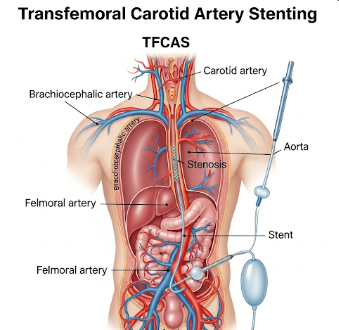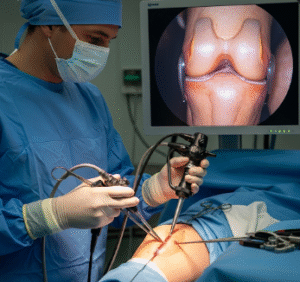Overview
Transfemoral Carotid Artery Stenting (TFCAS) is a minimally invasive endovascular procedure designed to treat carotid artery stenosis, a narrowing of the carotid arteries that supply blood to the brain. This procedure reduces the risk of stroke in patients with symptomatic or high-grade carotid artery disease.
In Korea, TFCAS is performed at advanced cardiovascular centers by experienced interventional cardiologists and radiologists using state-of-the-art imaging and stenting technology for optimal outcomes and minimal complications.
What is TFCAS?
TFCAS is an endovascular procedure where a stent is placed in the carotid artery via the femoral artery in the groin. The stent expands the narrowed artery, restoring adequate blood flow to the brain.
Indications include:
- ✦ Symptomatic carotid stenosis causing transient ischemic attacks (TIA) or minor strokes
- ➤ High-grade asymptomatic carotid stenosis (≥70%)
- ✦ Patients at high risk for open carotid endarterectomy
- ➤ Prevention of future ischemic strokes
Benefits include:
- Minimally invasive alternative to open surgery
- Immediate restoration of blood flow in narrowed arteries
- Shorter hospital stay and faster recovery
- Reduced procedural risk in high-risk surgical patients
What are the Benefits?
✅ Minimally invasive with no large neck incision
➤ Reduced stroke risk in patients with carotid artery stenosis
✅ Quick recovery and shorter hospitalization
➤ Suitable for high-risk surgical patients
✅ High success rate with modern stent technology in Korea
Procedure Details
1) How should I prepare for TFCAS?
- ✦ Blood tests, ECG, and imaging (CT angiography or carotid ultrasound)
- ➤ Discontinue certain medications as advised by the physician
- ✦ Fasting for 6–8 hours before the procedure
- ➤ Arrange post-procedure transportation as sedation or anesthesia is used
2) What happens during the procedure?
- ✦ Performed under local anesthesia with sedation
- ➤ A catheter is inserted through the femoral artery in the groin and guided to the carotid artery
- ✦ A balloon and stent are used to expand the narrowed artery
- ➤ Embolic protection devices are often used to prevent debris from causing stroke
- ✦ Real-time imaging ensures accurate stent placement
- ➤ Procedure duration: 60–120 minutes, depending on complexity
3) What happens after TFCAS?
- ✦ Hospital stay: typically 1–2 days for monitoring
- ➤ Vital signs and neurological status are closely monitored
- ✦ Antiplatelet therapy is prescribed to prevent stent thrombosis
- ➤ Follow-up imaging (ultrasound or CT angiography) ensures stent patency
- ✦ Most patients resume normal activities within 1 week, depending on recovery
Risks / Benefits
Possible Risks:
- Stroke or TIA during or after the procedure
- Bleeding or hematoma at the femoral access site
- Artery damage or dissection
- Restenosis (narrowing of the stented artery) over time
- Rare complications: heart attack or allergic reaction to contrast
Benefits:
- Minimally invasive stroke prevention
- Immediate improvement in blood flow through the carotid artery
- Short recovery compared to open carotid endarterectomy
- In Korea, advanced imaging and experienced specialists minimize procedural risks
Recovery and Outlook
- ✦ Most patients can walk and resume light activity on the same day or next day
- ➤ Antiplatelet therapy is continued for several months as prescribed
- ✦ Avoid heavy lifting or strenuous activity for 1–2 weeks
- ➤ Follow-up imaging ensures stent remains open and functioning
- ✦ Long-term outcome: reduced risk of stroke and improved cerebral perfusion
When To Call the Doctor
⚠ Sudden weakness, numbness, or speech difficulty
⚠ Severe headache or vision changes
⚠ Bleeding or swelling at the groin access site
⚠ Chest pain, palpitations, or shortness of breath
Best Korea Option / Process
Korean hospitals provide world-class TFCAS care, including:
- ✦ Experienced interventional cardiologists and radiologists
- ➤ Advanced stent and embolic protection technology
- ✦ State-of-the-art imaging for precise stent placement
- ➤ Short hospital stays and quick recovery programs
- ✦ Comprehensive pre- and post-procedure monitoring
- ➤ English-speaking international patient coordinators
Highlights of TFCAS in Korea
- ✅ Minimally invasive treatment for carotid artery stenosis
- ➤ Reduces stroke risk and restores cerebral blood flow
- ✅ Quick recovery with outpatient or short hospital stay
- ➤ Advanced stents and embolic protection devices for safety
- ✅ Highly skilled interventional teams in top Korean cardiovascular centers













